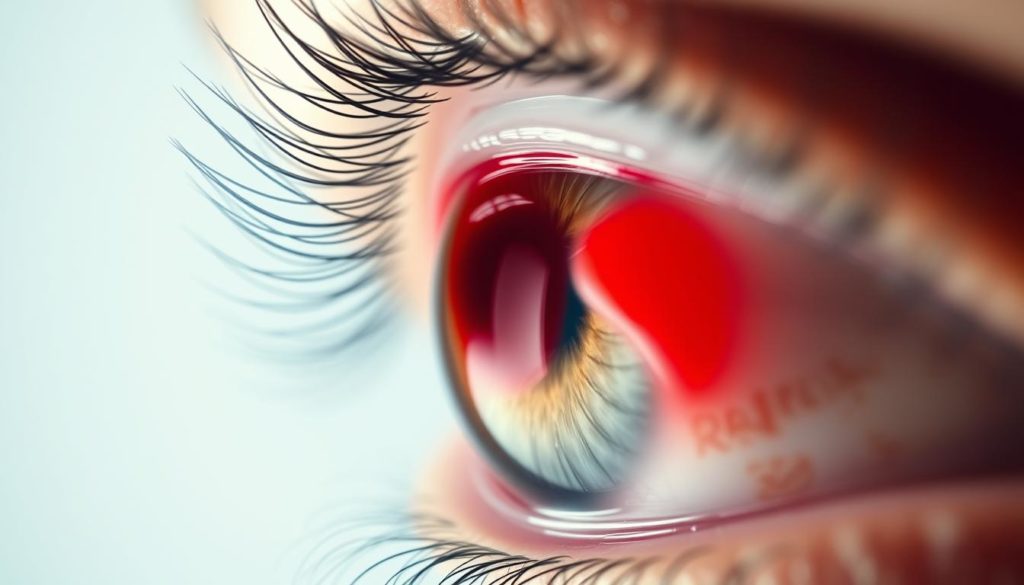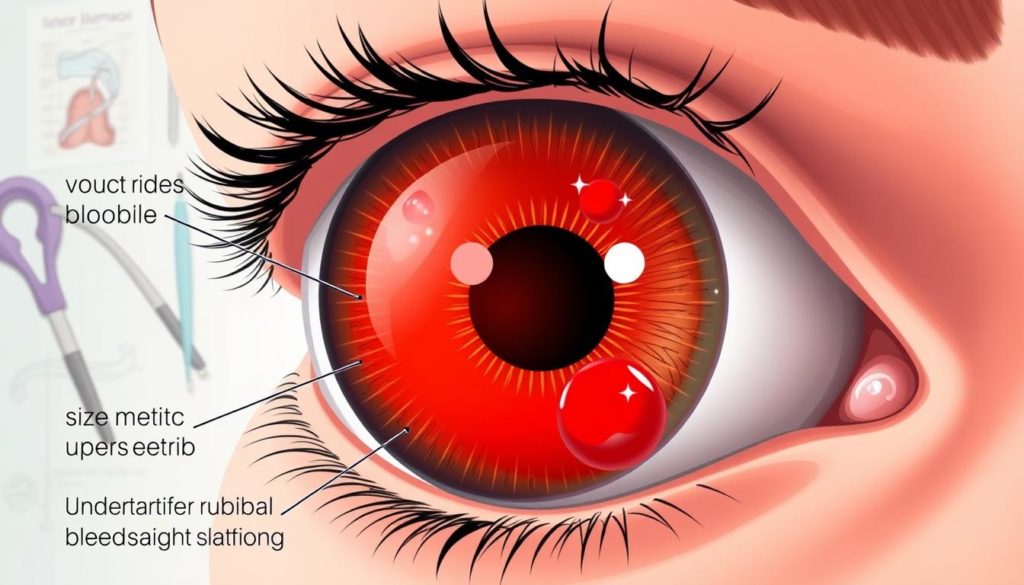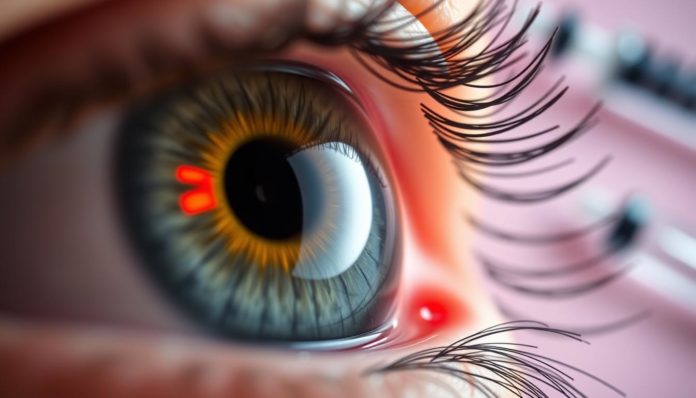Did you know that many hyphema cases are due to ocular trauma from everyday activities? Hyphema means blood collects in the eye’s front part. Knowing why eye bleeding happens is important for treating and preventing it.
This condition comes from injuries, health problems, or just happens. Being knowledgeable helps manage hyphema quickly and effectively.
What Is Hyphema?
Hyphema is when blood fills the space in front of the eye, between the cornea and iris. It affects how well you can see and can lead to other eye problems.

Definition and Overview
Hyphema means blood is present in the eye’s front chamber. It can be a tiny amount or fill it up. It’s important to treat it quickly to protect your vision.
Distinction Between Hyphema and Other Eye Conditions
Hyphema is unique because it deals with bleeding in a specific eye area. It’s different from other eye issues. This part of the eye controls pressure and feeds the eye. Knowing what makes hyphema different is key for proper care.
Common Causes of Hyphema
It’s key to know what leads to hyphema to prevent and treat it well. Many things can cause hyphema, from eye trauma to health problems and even no clear reason. Let’s look closer at these causes.
Trauma and Injuries
Blunt eye trauma tops the list for causing hyphema. It can occur during sports, fights, or accidents. Sports like boxing, basketball, and baseball often lead to such injuries. This is why wearing protective gear is crucial.
The hard hit breaks blood vessels in the eye, causing bleeding into its front part.
Underlying Medical Conditions
Some health issues make people more likely to get hyphema. Sickle cell disease makes it hard for blood to carry oxygen, raising bleeding risks. Also, conditions like hemophilia stop blood from clotting well. This makes eyes bleed more easily.
Taking blood thinners increases these risks too. So, it’s critical to manage this well and keep up with eye exams.
Spontaneous Hyphema
Sometimes, spontaneous eye bleeding happens without any injury. This usually affects people with certain health issues. These problems may involve blood vessels or clotting.
This rare type of hyphema shows why eye health checks are vital. They are especially important for those with known health issues.

Symptoms of Hyphema
Spotting symptoms of hyphema early is crucial for quick and effective treatment. Some symptoms are common and should not be overlooked. If hyphema begins, you might feel discomfort and see changes in your vision.
Pain and Discomfort
Many people with hyphema feel a lot of eye pain and discomfort. This pain might always be there or happen when in bright light. If eye pain gets worse or doesn’t go away, seeing a doctor is important.
Visual Impairments
Having trouble seeing is also common with hyphema. You may see things as blurry, red, or even see double. These issues can get worse if you don’t treat them. A full eye exam is key to treating any visual impairment quickly.
Indicators of Severe Cases
In serious hyphema cases, some symptoms need fast doctor help. High eye pressure, ongoing bleeding, or losing vision are serious signs. Getting diagnosed and treated fast helps avoid more eye problems and keeps your eyes healthy.
Diagnosing Hyphema: Procedures and Tests
Doctors use several steps to diagnose hyphema. First, they check the eye’s condition with a physical exam. Then, they use special tests for a precise diagnosis and to plan treatment.
Physical Examination
The first step is a detailed check of the eye. Doctors look for signs of bleeding, swelling, or damage. They also ask about any injuries or past health issues to find possible causes.
Slit Lamp Examination
The slit lamp test is key for finding hyphema. This tool lets eye doctors see the eye’s inner parts in detail, including the area where blood pools. It shines a narrow beam of light into the eye. This helps doctors see blood cells and other details for a correct diagnosis.
CT Scans and Other Imaging Techniques
If needed, doctors may use CT scans and other advanced imaging. These tools offer a full picture of the eye’s inside. They help find hidden problems not seen in basic tests. Imaging is great for spotting fractures or foreign items that make hyphema more complicated.
| Diagnostic Method | Purpose |
|---|---|
| Physical Examination | Initial assessment, identify visible symptoms |
| Slit Lamp Examination | Detailed inspection of eye structures |
| CT Scans and Eye Imaging | Advanced visualization for severe cases |
Hyphema Treatment Options
It’s crucial to know how to handle hyphema to avoid complications and ensure a smooth recovery. This part talks about the first steps, medicines, and surgeries used in treating hyphema.
Immediate Actions
Quick action is vital when dealing with hyphema. It’s often recommended that patients lie down with their head raised. This position lowers eye pressure and reduces the chance of more bleeding. It’s also important to avoid hard activities at the start of treatment.
Medications and Eye Drops
Medicines are key in hyphema treatment. Corticosteroids and atropine eye drops are commonly used to lessen inflammation and bleeding. These drugs help stabilize the condition and relieve pain. Following the doctor’s dosage and schedule strictly is essential for recovery.
Surgical Interventions
In tough cases, surgery might be the only option. Procedures like anterior chamber paracentesis or removing the clot can help. Surgery is mainly for when eye pressure is high or bleeding doesn’t stop with medicine.
Following the right treatment for hyphema and keeping an eye on it can lead to a good recovery. Working with an eye doctor for a tailored treatment plan and ongoing care is the way to the best results.
Hyphema (Eye Bleeding): Risk Factors and Prevention
Hyphema is bleeding in the front part of the eye. Understanding what causes hyphema helps in preventing it.
Activities and Sports
Some sports raise the chance of getting hyphema. Boxing, basketball, and martial arts are a few examples. Athletes in these sports should use strategies to avoid hyphema. Wearing protective eye gear is a smart choice to protect them from injuries.
Medical Conditions
Having certain health issues can make hyphema more likely. These include sickle cell anemia, blood clotting disorders, and diabetes. People with these conditions should keep them under control. They should also talk to doctors about extra prevention steps.
Preventive Measures and Protective Gear
Preventing hyphema involves certain steps. Wearing protective eye gear like safety goggles or face shields is important. These protect your eyes from harm during risky activities. Also, getting regular health checks can help catch and manage problems early. This can lower your chances of getting hyphema.
| Risk Factor | Preventive Action |
|---|---|
| Contact Sports | Wear protective eye gear |
| Pre-existing Medical Conditions | Regular health check-ups and management |
| High-Risk Occupations | Use of safety goggles and face shields |
Complications Associated with Hyphema
Hyphema can lead to serious problems if not treated quickly. It can affect many parts of the eye’s health. That’s why it’s essential to keep an eye on it and get medical help as needed.
Increased Intraocular Pressure
Increased intraocular pressure is a major complication of hyphema. This happens when blood blocks the eye’s drainage system. If this isn’t fixed, it can cause a lot of pain and damage over time.
Corneal Blood Staining
Corneal blood staining is another important issue. If red blood cells stay too long in the front part of the eye, they can stain the cornea. This rusty staining needs quick treatment to avoid permanent scars and vision problems.
Permanent Vision Loss
The worst case with hyphema complications is losing your sight. If the eye keeps bleeding, or if there are many episodes, it can harm the eye badly. This makes it super important to check the eye regularly and get help early on.
| Complication | Description | Consequences |
|---|---|---|
| Increased Intraocular Pressure | Elevation in fluid pressure inside the eye due to blocked drainage | Potential damage to the optic nerve, pain, and other issues if untreated |
| Corneal Blood Staining | Red blood cells infiltrate the cornea, causing discoloration | Potential for permanent corneal scarring and visual impairment |
| Permanent Vision Loss | Chronic bleeding or recurrent hyphema damaging ocular structures | Irreversible loss of sight |
Managing Hyphema at Home
Managing hyphema at home is key for a good recovery and avoiding more problems. It involves following certain steps to reduce risks and help heal.
Resting and Elevating the Head
Rest is crucial for home care for hyphema. It’s important to avoid hard activities that might make things worse. Sleeping with the head raised can help lower eye pressure. This eases discomfort and aids in healing.
Using Eye Shields and Patches
Using eye patches and shields at home is very important. They prevent hits or rubs that could increase the hyphema. Doctors advise to wear these all the time, especially when sleeping, to protect the eye.
Monitoring and Follow-up Care
Keeping an eye on any changes is vital for spotting problems early. Follow-up care means going to all eye doctor visits to check eye pressure and healing. Keeping these appointments helps avoid issues and ensures a smooth recovery.
Following these steps enhances home care for hyphema success. Staying committed to follow-up care visits and using eye protection helps with healing.
When to Seek Emergency Medical Help
Knowing when a hyphema is severe is key to getting the right help quickly. You must look for emergency care promptly if there’s re-bleeding in the eye. This could mean a serious problem. A sharp rise in eye pressure can also cause a lot of pain and even loss of vision. This is a sign of an urgent eye injury emergency.
If you have extreme eye pain, sudden vision loss, or signs of an infection like redness, swelling, or discharge, it’s a red flag. These symptoms mean the condition could be getting worse. It’s important to seek expert care immediately. Don’t wait to go to the emergency room or call an eye doctor right away.
For tips on dealing with these emergencies, check out the detailed guide on hyphema and eye internal bleeding. This guide gives advice on managing the issue well while avoiding problems from bleeding again or infection.
Here are important steps for a hyphema emergency:
- Contact your healthcare provider immediately if you suspect re-bleeding.
- Monitor for elevated intraocular pressure and seek emergency help for hyphema if pain intensifies.
- Watch for signs of infection, such as increasing redness or discharge.
Quick action in an eye injury emergency can help a lot with recovery and avoid more issues.
Questions to Ask Your Doctor About Hyphema
When you find out you have hyphema, it’s very important to talk openly with your doctor. Sharing your worries and questions makes a big difference. It helps you understand and deal with the condition better.
- What is the size of the hyphema? – Knowing the size can help gauge the severity and treatment approach.
- Is there potential for permanent damage? – Ask this to understand any long-term implications.
- What medications or treatments are recommended? – Clarify any medication adjustments that may be necessary.
- How can I prevent recurrences? – Inquire about preventive steps to minimize future risks.
“Asking the right questions for doctors can lead to a clearer understanding of hyphema and its complications, ensuring you get the best possible care.”
Don’t hesitate to bring up any concerns you have about hyphema. Talking about them can make your treatment plan better and help you heal. Always remember, the right questions for doctors are key to improving your eye health.
Living with Hyphema: Long-term Outlook
Adjusting to life with hyphema involves understanding your future health. It’s essential to reduce its impact on everyday activities. You must also commit to regular eye check-ups. The recovery journey depends on how severe the condition was at first. It also depends on if complications happen during healing.
Prognosis
The long-term outlook for hyphema patients is usually good, especially with quick and proper treatment. The severity of the initial injury is a big factor in recovery. Mild cases often get better with no lasting harm. But, severe cases might need long-term medical care. Regular visits to an eye specialist are key to watch for complications, like glaucoma, that could change the outcome.
Impact on Daily Life
Hyphema can affect many parts of your daily life, especially if you have ongoing vision problems or a long recovery. It’s critical to stay away from hard activities or anything that could make the condition worse. Learning to live with these limits helps make recovery smoother. Using protection like eye shields can help keep life as normal as possible during healing.
Regular Eye Check-ups
Eye exams are critical for anyone recovering from hyphema. These check-ups keep an eye on your health, stop complications, and quickly handle any side effects. Making sure you don’t miss appointments helps catch problems early, like high eye pressure or other vision issues. This makes for a safer long-term health outlook.
FAQ
What is hyphema?
Hyphema is when blood fills the front part of your eye. This can happen after an injury, because of some health problems, or for no clear reason.
How is hyphema different from other eye conditions?
Hyphema is all about bleeding in the eye’s front chamber. It’s not like other eye issues that affect different parts or come from other causes.
What are the common causes of hyphema?
Big causes are eye injuries, conditions like hemophilia or sickle cell disease, and using blood thinners. Sometimes, hyphema just happens without an injury.
What symptoms should I watch for with hyphema?
Look out for pain, light bothering your eyes, blurry vision, and seeing red. If it’s bad, you might notice other serious symptoms too.
How is hyphema diagnosed?
Doctors check your eyes up close, do vision tests, and might use a special lamp to see the bleeding. Bad cases may need a CT scan.
What treatment options are available for hyphema?
You might need to rest in bed, keep your head up, or use certain eye drops and medicines. Sometimes, surgery is needed to fix it.
What are the risk factors for developing hyphema?
Doing certain sports, having specific health issues, and not wearing eye protection can up your risk. Eye injuries are a big culprit.
Are there complications associated with hyphema?
Yes, you could get eye pressure problems, stained corneas, or even lose your sight if it’s not handled right.
How can I manage hyphema at home?
Stay resting with your head higher, use any drops or pills the doctor gave you, and check your eye pressure often with a doctor.
When should I seek emergency medical help for hyphema?
Get help fast if bleeding comes back, your eye pressure shoots up, you get an infection, or things seem to get worse.
What questions should I ask my doctor about hyphema?
Ask how big the bleed is, if you could lose sight, how to adjust your meds, and how to avoid more eye problems.
What is the long-term outlook for living with hyphema?
It really depends on how bad the injury was and if you get complications. Keeping up with eye doctor visits is key for your eye health.


